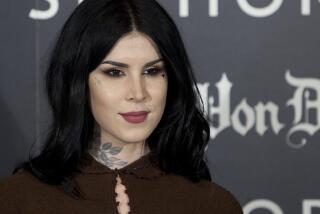Sorayama prevails over art dealer
- Share via
A federal judge has taken some of the sweetness out of the cheesecake business for a Beverly Hills art dealer and publisher known for selling soft-core erotic paintings and prints of female nudes. She slapped him with a nearly $2-million judgment that includes $1 million in punitive damages for defrauding Hajime Sorayama, a prominent artist in the “pinup” genre.
U.S. District Court Judge Florence-Marie Cooper found that, based on evidence in a four-day nonjury trial in June, Robert S. Bane used EBay to flood the market with inexpensive prints of Sorayama’s work, deflating the price the artist could command.
Bane and Sorayama’s seven-year business relationship soured in 2001, when an audit revealed that eight paintings that the artist had entrusted to Bane to sell were missing. The Japanese painter sued in 2005.
Sorayama, born in 1947, paints voluptuous women and gleaming, metal-skinned “sexy robots.” Sony Corp. commissioned him to create the prototype for Aibo, a robotic pet dog that went on sale in 1999. He also created the cover art for the rock band Aerosmith’s 2001 album, “Just Push Play”; it shows one of his robot maidens with a fluttering, hiked-up yellow skirt, à la Marilyn Monroe in the subway grate scene from “The Seven Year Itch.”
The judge, in a decision filed Sept. 4, found Bane had dumped scores of Sorayama’s limited-edition lithographic and computerized giclée copies via EBay, selling prints with values of at least $300 and $700, respectively, for $100 or less.
The ruling said that the unauthorized discounting made it hard for Sorayama to sell his work at regular prices, noting that his annual earnings from art reproductions dropped from $125,000 a year before 2001 to an average of $40,000.
The judge awarded Sorayama $962,000 for lost profits, settlement of an unpaid debt and Bane’s breach of fiduciary duty and improper use of the artist’s paintings.
An additional $1 million in punitive damages was justified, the judge wrote, because “the record is replete with misrepresentations made by Bane. . . . Paintings were sold without payment. . . then lies were told to cover up the sales. The shifting of blame, reinvention of facts and dissembling went on for years while Bane repeatedly said he was trying to do what was best for Mr. Sorayama.”
Sorayama’s New York-based agent, Miharu Yamamoto, said in an e-mail this week that Bane was “treated leniently,” given the damage to the artist. Prices for Sorayama reproductions remain depressed, she added, with some “tentative improvements.”
An employee reached by phone at Robert Bane Fine Art said Bane had no comment. His lawyer, Lawrence Washor, said Tuesday that Bane considers the ruling “unjust” and intends to appeal.
Bane built his business starting in 1983 by selling the erotic art of Olivia DeBerardinis, according to the website of the Tamara Bane Gallery, named for his wife. Now an Internet-only operation, it was also a walk-in gallery until several years ago.
Using Olivia as her nom de brush, DeBernardinis became a star of the genre and regularly produces nudes for Playboy magazine in the “Vargas girl” pinup tradition
Joel Beren, DeBerardinis’ husband and business partner, said their long relationship with Bane ended several years ago after the closing of the gallery’s final location on La Brea Avenue.
“We wouldn’t have stayed with him that long if we didn’t feel he was doing a good job,” Beren said, adding that practices such as those discussed in the Sorayama ruling were “not our experience.”
The Japanese artist “is somebody we admire,” Beren said. “I’m very sorry to hear it came to that.”
More to Read
The biggest entertainment stories
Get our big stories about Hollywood, film, television, music, arts, culture and more right in your inbox as soon as they publish.
You may occasionally receive promotional content from the Los Angeles Times.











